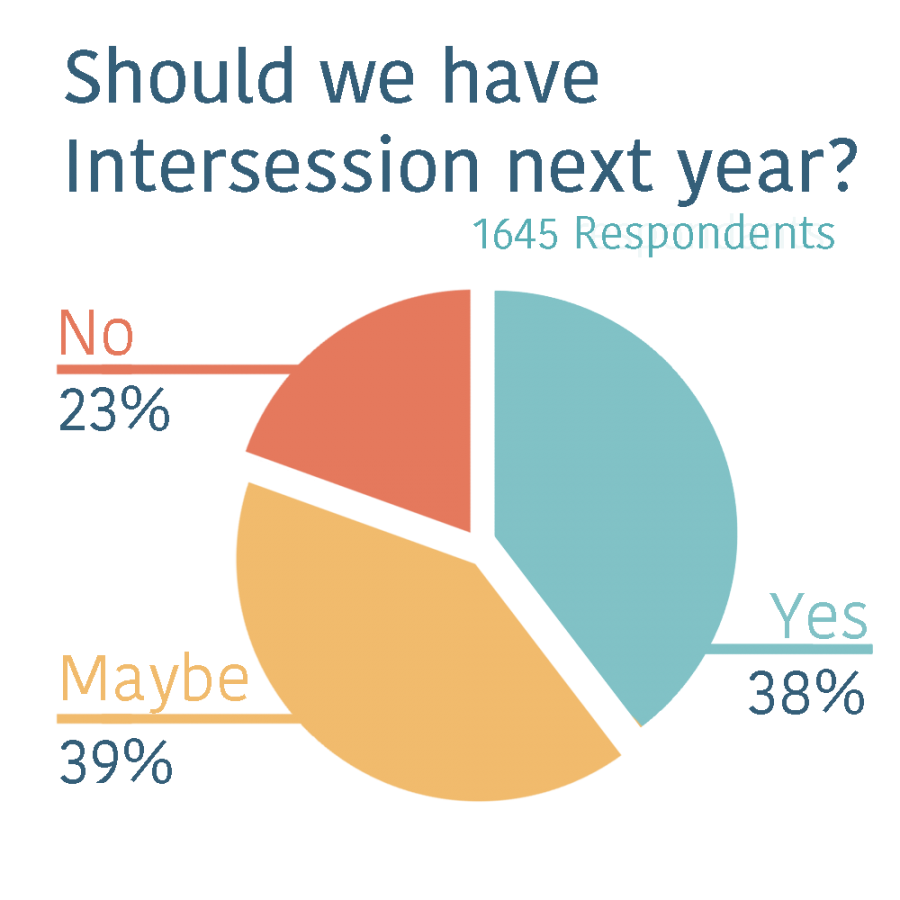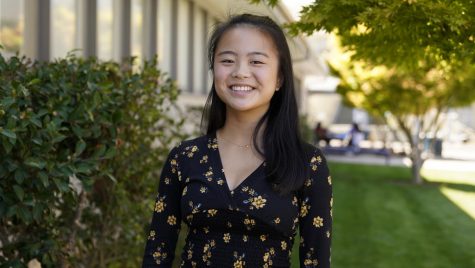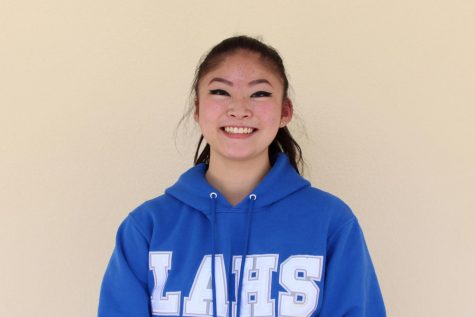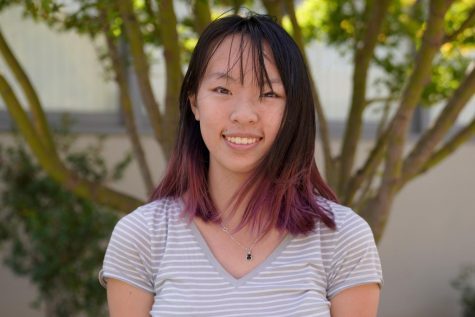Intersession Receives Mixed Reactions
February 13, 2018
The pilot Intersession was met with both high praise and sharp criticism from students and staff, and many voiced suggestions for improvements. Of students surveyed by Los Altos’ Leadership Team, 38 percent said they want to have Intersession next year, 39 percent said they might and 23 percent said they do not.
Originally proposed by Principal Wynne Satterwhite, Intersession gave students three days to preview classes and take elective-style Student Choice Sessions with teachers. Mandatory annual assemblies were rescheduled to occur during the half week as well; freshmen attended Los Altos’ second Challenge Day event, guest speakers held a consent presentation and the College and Career Center hosted grade-specific workshops. Discussions are ongoing about whether Intersession will happen next year.
“I would want to do it again because we learned so much,” Satterwhite said. “But the jury’s still out.”
Class Conversations
The Saturday, January 6, deadline to enter courses caused stress about class selections, as the Intersession schedule lacked time for students to seek individualized advice from teachers. During Intersession, counselors and administration told students they would be unable to switch their classes at the beginning of next school year.
Students will only be able to correct scheduling errors after receiving verification letters in March. Acceptable reasons for corrections include: if students accidentally selected the wrong class, if a course filled up or if students realize they’re taking too many challenging courses.
Some students felt reluctant to ask unfamiliar teachers questions when surrounded by unfamiliar students during sessions, and others felt they could have benefitted from individualized teacher and counselor advice in the context of their entire schedule.
“We only have four days to decide, so it’s stressful and last minute,” sophomore Lauren Miyahara said.
Some students said some of the seven allotted 30-minute sessions did not leave much room for student questions in some departments because teachers did not have time to cover large course selections.
The presentations did help students become more aware of their class options. The performing arts department in particular liked the conversations as a way to inform students about their almost 20 course offerings that are not always common knowledge.
“The class conversations to me were by far the best things about Intersession,” Performing Arts Department Coordinator Nancy Moran said. “There were a number of kids who were like, ‘Oh yeah, I didn’t think about acting and dance as fulfilling my art requirement.’ They think about art as, ‘I’m either going to draw or paint or do photography.’”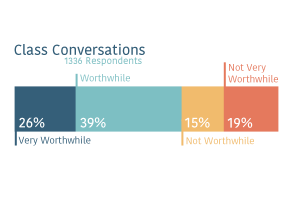
In addition, many teachers made themselves available through email for students to ask them individual questions about their courses. Several teachers said they received as many or more questions from their current students about courses as they did in the past.
“I’d say Class Conversations, at a bare minimum, got kids thinking, ‘Oh, it’s okay to go ask my teachers,’” Science Department Coordinator Darren Dressen said.
Challenge Day
After last year’s well-received trial run of Challenge Day, a program designed to build empathy and community among students, all freshmen participated in Challenge Day during Intersession. Students had generally positive experiences with the program — 85 percent of students surveyed by English teacher Margaret Bennett and her fellow Challenge Day coordinators said all 9th graders should experience Challenge Day.
“It was actually nice to totally forget about what was going on with the course selections and focus on what was happening with other people,” freshman Colby Cook said.
Freshmen spent the majority of Challenge Day in smaller groups of seven, including one parent or teacher volunteer. Students began by completing icebreakers, then went through different activities to learn about other students and share personal experiences they wouldn’t normally talk about.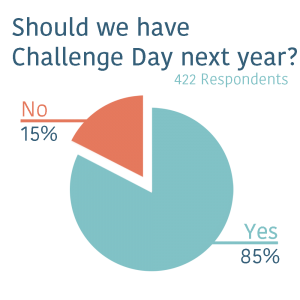
Students interviewed said they walked away from Challenge Day with a newfound awareness of the hardships their peers experience and respect for those they may not typically talk to.
But some students found certain aspects of Challenge Day less desirable. The students stayed in the gym from 8 a.m. to 3 p.m., and while they had a couple breaks, they were not allowed outside. The atmosphere of Challenge Day, created by the Challenge Day program leaders, adult volunteers and students, also encouraged lots of hugging. But some students felt uncomfortable with physical contact and pressured into hugging other students to avoid hurting their feelings.
Some were concerned with the intensity of emotions brought up during Challenge Day. To make sure students had support, the Challenge Day program requires someone from the school to be available to counsel students in need after the program. Los Altos had counselors available on Saturday and after each session, and Los Altos’ Challenge Day coordinators handed out youth resource cards at the end of each session with crisis hotline information to students.
The program cost $20,850 for six sessions — with 100 students per session — or $34.75 per student. The PTSA contributed over $14,600, and the rest came from Los Altos’ donation account and carryover money from the previous school year.
Student Choice Sessions
Teachers said the Student Choice Sessions gave them a chance to interact with students in ways they wouldn’t normally. But although the sessions allowed teachers and students to explore new topics unrelated to regular curriculum, the limited amount of planning time resulted in several logistical problems.
Some staff members found it difficult to deal with their normal workload on top of preparations for the additional activities.
“I felt a little rushed because I was doing a lot of other things and I couldn’t put in as much time [to prepare] as I wanted to,” Dressen said. “Some kids weren’t necessarily in the classes they had signed up [for either], so as a teacher, that [was] a difficult situation [because they] weren’t that thrilled to be there.”
Before Christmas break, students selected two preferences for “Student Choice Sessions” — freshmen were only allowed one because Challenge Day was mandatory and took up three blocks — from a list of activities staff were interested in teaching.
“I didn’t get any of the activities that I chose, [and] in my opinion, that’s where they went wrong,” sophomore Megan Pan said.
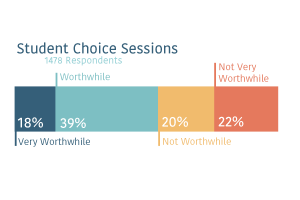 Despite the problems with Student Choice Sessions, Dressen, who participated in something similar in college, believed Intersession was a worthwhile experience. But rather than use seven of the nine blocks to accomplish administration-mandated “to-do list” activities, he suggested emphasizing the student choice aspect to reduce the amount of class switching and make scheduling easier.
Despite the problems with Student Choice Sessions, Dressen, who participated in something similar in college, believed Intersession was a worthwhile experience. But rather than use seven of the nine blocks to accomplish administration-mandated “to-do list” activities, he suggested emphasizing the student choice aspect to reduce the amount of class switching and make scheduling easier.
Counselors also spent all nine 90-minute blocks presenting to students and did not get to participate in choice sessions.
“I saw a lot of fun the kids were having and I just wish we were able to be with the kids on another side,” counselor Tamesha Wise said. “[A few of us] wish we could have been able to do more fun pieces rather than just doing the scheduling piece.”
Consent Presentation and College and Career Workshop
Although 53 percent of students surveyed found author and sexual assault expert Anea Bogue’s consent presentation worthwhile or very worthwhile, many were concerned it repeated messages from last year’s.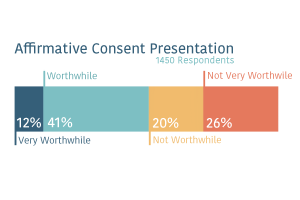
Guest speaker and alumnus Thara Salim ‘17, who talked about her experiences with sexual assault in a Q&A, commended Los Altos’ efforts to ensure the safety of its students.
“[This] speaks about the volume [of] care the administration has for its students and the belief that they can turn the tide to [create] a more positive world in which students are able to practice the language of consent and have more healthy interactions,” Salim said.
The College and Career Center also hosted workshops; sophomores were introduced to the college application process, while juniors and seniors learned about college life through alumni panels. College and Career Center Coordinator Andrea Gorman and College Counselor Angela Price received positive feedback from all grade levels, including seniors.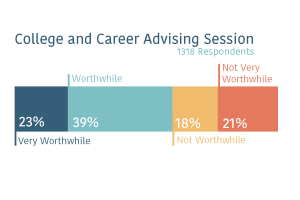
Regardless of initial issues, Gorman believed this year’s Intersession was worthwhile and would help the administration segue into an improved Intersession if they did it next year.
“We think it was a good idea to try it, and now we have a year to figure out how we would perfect it,” Gorman said. “I’m just glad we tried it once. You [just] have to jump in and [do] it.”



